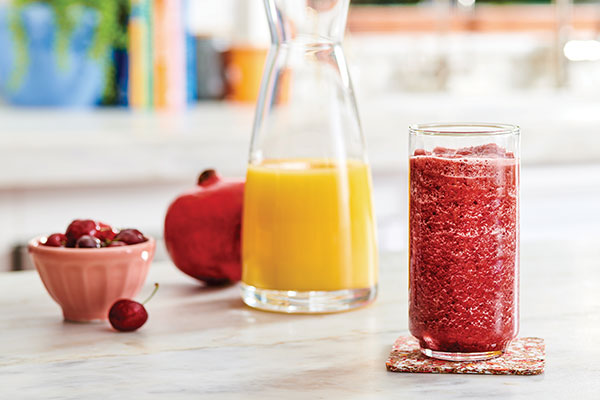HEALTHY LIVING
Delicious ways to support your immune system

(Family Features) Bolstering your immune system during winter, when coughs and colds seem to take control, is a must for the entire family. Supporting your wellness can start in a simple place – with the foods you eat and drink.
Consider an easy choice for any season like Florida Orange Juice, which can help you and your loved ones get the vitamins and minerals you need all winter long. With 100% of the daily recommended value of vitamin C in every 8-ounce serving along with key nutrients like potassium and magnesium, there’s a reason it’s referred to as the “Original Wellness Drink.”
With no added sugar or artificial flavor, it provides the benefits you need without the additives you don’t. It contains natural sugar from the whole fruit for a delicious solution that’s one of nature’s nutrient-rich foods with vitamins, minerals and phytonutrients. Plus, it’s easy to use as a nutritional ingredient in wintertime favorites like this comforting Orange Juice and Coconut Chickpea Soup or to start your day strong with a Superfruit Breakfast Smoothie.
Paired with a healthy lifestyle, 8 ounces of 100% orange juice may help support a healthy immune system as an excellent source of vitamin C and a good source of vitamin D in fortified juices. Vitamin C is commonly associated with helping maintain and strengthen healthy immune systems by protecting cells and promoting the production and function of immune cells. Meanwhile, vitamin D also plays an important role in regulating immune response by helping immune cells fight off bacteria and viruses.
“Safeguarding your health against the spread of illness is important year-round, especially during colder months when reports of cold and flu increase,” said Dr. Rosa Walsh, director of scientific research at the Florida Department of Citrus. “A key step in supporting your immune system is maintaining a well-balanced diet that is high in essential nutrients. Incorporating an 8-ounce glass of 100% orange juice can help you meet the recommended daily value of vitamin C and support your hydration.”
Beneficial plant compounds, like those in Florida Orange Juice, along with flavonoids and colorful carotenoids work to support the immune system by fighting inflammation and helping cells communicate, which can help strengthen immune responses when encountering infections.
Additionally, 100% orange juice is a source of phytonutrients like hesperidin, which has been shown in clinical studies to have antioxidant-like properties, heart health benefits and may help reduce inflammation. Hesperidin has also been linked with benefits related to cognitive function, immune system function and bone health.
To find more information and immunity-boosting winter recipes, visit FloridaJuice.com.

Orange Juice and Coconut Chickpea Soup
Servings: 8
- 1 tablespoon olive oil
- 1 cup diced yellow onion
- 1 red bell pepper, diced
- 1 1/2 cups diced carrots
- 1 1/2 teaspoons kosher salt
- 3 cloves garlic, finely grated
- 1/2 teaspoon ground cardamom
- 1 quart vegetable broth
- 1 can (14 ounces) light coconut milk
- 1 can (14 ounces) chickpeas, drained and rinsed
- 1/2 cup Florida Orange juice
- chopped cilantro (optional)
- In medium saucepan over medium high, heat olive oil until it shimmers.
- Add onions, bell pepper, carrots and salt; cook until onions are translucent, 5-7 minutes.
- Add garlic and cardamom; cook 1-2 minutes, or until garlic is fragrant. Do not brown.
- Add vegetable broth, coconut milk and chickpeas; bring to simmer.
- Decrease heat to low and cook until carrots are tender, about 10 minutes.
- Add orange juice, remove from heat and stir. Taste and adjust seasoning as desired.
- Serve garnished with cilantro, if desired.

Superfruit Breakfast Smoothie
Servings: 2
- 8 ounces Florida Orange Juice
- 4 ounces dark sweet cherries
- 2 ounces pomegranate juice
- In blender, puree orange juice, cherries and pomegranate juice then serve.
SOURCE:
Florida Department of Citrus
HEALTHY LIVING
Make a smart home investment with an all climate heat pump

(Family Features) If your home uses a conventional heating and cooling system, you may wonder if there’s a better way to manage indoor comfort. Between rising energy costs and concerns about the efficiency of conventional systems, many homeowners are exploring alternatives. One popular solution is an all-climate heat pump.
All-climate heat pumps are the next generation of heat pump technology built for peak performance, regardless of the outdoor temperature. From the personalized comfort all-climate heat pumps deliver to the energy savings realized, it’s no wonder more homeowners are considering going all-in on all-climate.
If you’re considering replacing your current HVAC system, read on for some of the benefits of all-climate heat pumps.
Personalized Comfort
Ductless, multi-zone, all-climate heat pump systems are designed to deliver personalized, room-to-room temperature control tailored to your preferences. Unlike traditional ducted unitary systems, which typically operate on an all-or-nothing basis, ductless multi-zone solutions provide individualized climate settings for each space. Whether you prefer a warmer living room or a cooler bedroom, the flexibility to adjust each zone offers unparalleled convenience and energy efficiency.
Efficiency
According to a survey of U.S. homeowners commissioned by Mitsubishi Electric Trane HVAC US (METUS), 93% of homeowners surveyed with conventional HVAC systems reported concerns about utility bills. Seventy-five percent of those surveyed also consider energy efficiency always or often when considering home improvements.
Conventional heating and cooling systems run at full capacity to reach set point and then shut off. The start-stop action ultimately wastes energy. With variable-capacity capabilities and inverter-driven technology, all-climate heat pumps can adjust and maintain temperatures, lessening your home’s overall energy demand and driving down cost.
Cost Savings
The cost savings provided by efficient energy usage are evident. Additionally, some states offer rebates for new HVAC systems, and many contractors offer financing options, which make the upfront cost of an all-climate heat pump installation more affordable.
Reliability is another cost-saving factor. All-climate heat pumps are purpose-built with durable materials to perform well in all kinds of weather.
“We continue to educate homeowners about the advantages all-climate heat pumps have over conventional HVAC systems,” said Mark Kuntz, Chief Executive Officer, METUS. “As homeowners become more knowledgeable about the numerous benefits, including personalized comfort, energy efficiency and cost savings, we believe they will increasingly install these next-generation systems in their homes.”
Learn more about how you can better manage your home’s indoor comfort with all-climate heat pump technology by visiting mitsubishicomfort.com.
SOURCE:
Mitsubishi Electric
HEALTHY LIVING
How to protect your pet’s dental health

(Family Features) Like humans, pets’ oral hygiene plays an important role in their overall health and quality of life. Common conditions like plaque buildup, tartar and bad breath can escalate to serious health conditions if untreated.
In fact, by the age of 3, 80% of pets experience some form of dental health issue, and the risk only increases as they age. However, for many pet owners, taking care of their four-legged friends’ oral health is a more difficult habit to maintain than their own daily brushing and flossing routine.
Many veterinarians recommend regular brushing for pets, and a wide array of treats and meal additives complement brushing to help support your pet’s oral health.
Protecting your pet’s oral health begins by talking with your veterinarian, who can provide recommendations tailored to your pet’s specific needs. With that guidance, you can start comparison shopping and reading labels so you can identify quality products. Remember you’re likely to find the greatest success by introducing oral health products as part of your pet’s daily routine early on.
Certifications for Trust and Quality
awarded to products that meet strict standards for controlling plaque and tartar. You can find the seal on packaging as an easy visual indication of the product’s quality standards.
Natural, Effective Ingredients
Look for products that prioritize safety and health by offering natural, clinically proven ingredients and no artificial additives or chemicals. Seaweed (or kelp) is a preferred ingredient because it contains minerals and enzymes that help reduce plaque and prevent bacteria.
You can find 100% natural and organic kelp in products like ProDen PlaqueOff®, which includes A.N ProDen®, a kelp ingredient sustainably harvested from specially selected locations in the pristine North Atlantic waters off the Scandinavian coastline. Processed through a specialized method in extreme environmental conditions, it attains peak quality and effectiveness, ensuring safety and health for your pet.
Sustainable Practices
Another detail you can gather from the product’s packaging is whether a product manufacturer adheres to environmentally friendly practices and safe ingredient sourcing, which means the product is not only good for pets but also for the planet. This may be evident in certifications or special icons on the packaging, through information about sustainably harvested ingredients or with packaging that itself is environmentally responsible.
Tailoring to Individual Pets
Different pets have different needs based on age, size, breed and oral health status. Selecting the right product may also be complicated by your pet’s allergies or picky eating habits. You can find a variety of ingestible options, including powders, chews or bones like those offered by ProDen PlaqueOff®, to use in conjunction with daily brushing.
- Powder: Ideal for a seamless addition to your pet’s diet, this is the most economical choice, particularly for long-term use. It’s especially suitable for younger pets as a preventive measure, given its longevity and cost-effectiveness.
- Chews: For those looking for an easy-to-administer option that doubles as a reward, chews are the way to go. Additionally, for older pets or those with missing teeth, soft chews can offer a gentle yet effective way to maintain oral health. They’re a convenient choice for pet owners to give as a daily dose without the need for measuring or mixing.
- Bones: Designed not only to satisfy your dog’s natural chewing instincts but also to aid in dental care, bones are a perfect option for pet parents whose dogs prefer a longer-lasting treat. Bones come in a variety of flavors and sizes, catering to both large and small breeds, making them a versatile way to help keep your dog’s teeth clean and their breath fresh.
Learn more about protecting your pet’s dental health at us.swedencare.com.
Photo courtesy of Shutterstock (veterinarian examining dog)
SOURCE:
Swedencare
HEALTHY LIVING
A guide to great skin at any age

(Family Features) Here’s the secret for achieving a glowing complexion: there is no secret. In fact, a key factor in achieving great skin at any age comes down to one common denominator that’s no secret at all. It’s simply taking good care of your skin.
After all, your skin is your body’s single largest organ. It’s your protective shield, but it can also reveal the truth of your age, especially if you’re lax when it comes to regular skin care.
Make hydration a priority. Keeping the skin hydrated maintains its barrier integrity. When the skin becomes dry, it reduces the effectiveness of the skin barrier, making it less resilient against irritants and allergens.
Often, when the skin is dry it feels more rough or flaky. With proper hydration, the skin feels smoother and looks more supple. Achieving hydration through a better skin care routine, drinking plenty of water daily and eating certain fruits and vegetables can improve your skin’s appearance, maintaining a radiant, healthy complexion.
Use the right soap. Despite what your mother may have told you, squeaky clean isn’t always best. A better bet when it comes to soap is a product that respects your skin’s moisture balance and cleanses without creating tightness or irritation.
Mild options such as Pears skin cleansing products are specifically formulated and dermatologically tested to be gentle on the skin. They’re made with plant-based glycerin, which is a powerful humectant that attracts water from the environment and deeper layers of the skin to the outer layer, keeping it hydrated. Glycerin-based cleansers can help prevent stripping of the skin’s natural oils, which averts a tight, dry feeling.
“More than ever, consumers are looking for mild and gentle products that are effective, smell good and work well,” said Dr. Adriana Lombardi, founder of the Skin Cancer & Cosmetic Surgery Center of New Jersey. “Pears soap checks all the boxes. It creates a really nice, thick lather and smells crisp and clean while leaving the skin hydrated.”
Avoid hot showers. Even the best products may not overcome the potential harm that comes from taking showers that are too hot. The heat removes your skin’s natural oils, which leaves you prone to itching and dryness and may worsen skin conditions.
Instead of cranking up the heat, opt for lukewarm temperatures and keep the shower time brief. Use moisturizing cleansers, and after your shower, immediately apply moisturizer to replenish and rehydrate your skin.
Protect your skin from the sun. After completing your skin cleansing routine, there’s an additional step to help maintain healthy, hydrated skin before heading outdoors: Take time to apply a layer of sunscreen to skin that will be exposed, including your face, ears and hands. Reapply every two hours if you’re spending a great deal of time outside. Sun damage can prematurely age the skin. You may not feel the heat as much during colder times of year, but the rays are still capable of damaging your skin, maybe even more so because you don’t feel the burn
Find more advice for keeping your skin supple and soft at Amazon.com/pears.
3 Steps to Practice a Healthy Skin Routine
- Use a humidifier in your room. Adding moisture to your environment may help prevent over-drying and promote better air quality for your overall health, including your skin.
- Use glycerin-based soap. A glycerin-based soap like Pears gently cleanses your skin without stripping essential moisture.
- Moisturize immediately after showering. Showering, especially at higher water temperatures, can strip your body’s natural oils. Applying lotion immediately after you shower helps retain the moisture your body nee
Photos courtesy of Shutterstock (woman applying moisturizer, man applying moisturizer)
SOURCE:
Pears
-

 NEWS2 years ago
NEWS2 years ago2 hurt, 1 jailed after shooting incident north of Nocona
-

 NEWS1 year ago
NEWS1 year agoSuspect indicted, jailed in Tia Hutson murder
-

 NEWS2 years ago
NEWS2 years agoSO investigating possible murder/suicide
-

 NEWS2 years ago
NEWS2 years agoWreck takes the life of BHS teen, 16
-

 NEWS2 years ago
NEWS2 years agoMurder unsolved – 1 year later Tia Hutson’s family angry, frustrated with no arrest
-

 NEWS2 years ago
NEWS2 years agoSheriff’s office called out to infant’s death
-

 NEWS2 years ago
NEWS2 years agoBowie Police face three-hour standoff after possible domestic fight
-

 NEWS2 years ago
NEWS2 years agoDriver stopped by a man running into the street, robbed at knifepoint







